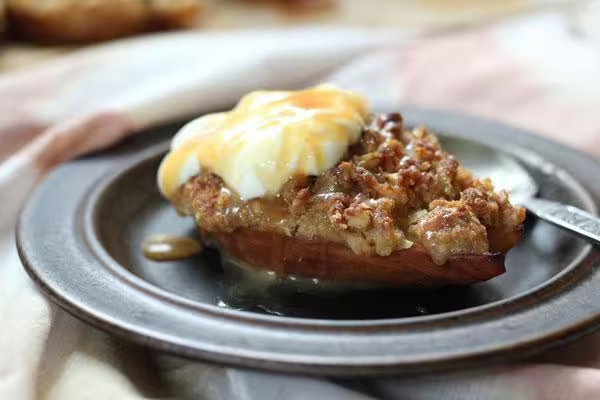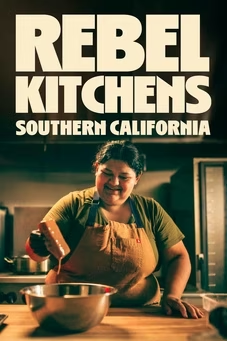
John Yanga's Roasted Chicken and Mixed Vegetables
Season 7 Episode 2 | 5m 48sVideo has Closed Captions
See how John's brilliant garden nourishes his entire community.
John Yanga, a refugee from South Sudan, is truly a vegetable whisperer, expertly transforming every imaginable vegetable from his farm into exquisite dishes.
Problems playing video? | Closed Captioning Feedback
Problems playing video? | Closed Captioning Feedback

John Yanga's Roasted Chicken and Mixed Vegetables
Season 7 Episode 2 | 5m 48sVideo has Closed Captions
John Yanga, a refugee from South Sudan, is truly a vegetable whisperer, expertly transforming every imaginable vegetable from his farm into exquisite dishes.
Problems playing video? | Closed Captioning Feedback
How to Watch Kitchen Vignettes
Kitchen Vignettes is available to stream on pbs.org and the free PBS App, available on iPhone, Apple TV, Android TV, Android smartphones, Amazon Fire TV, Amazon Fire Tablet, Roku, Samsung Smart TV, and Vizio.

Get More Kitchen Vignettes
Get more recipes on the Kitchen Vignettes blog. Available on PBS Food.Providing Support for PBS.org
Learn Moreabout PBS online sponsorship(gentle music) (birds chirping) - [John] My name is John Yanga.
I've been farming in Maine 11 years.
I'm originally from South Sudan.
And I grew up as a young farmer with my dad who taught me how to farm.
(gentle music) (birds chirping) When I came to this country in 2000 as a refugee, I started to help other farmers as a volunteer.
And then I started to join the program which is called Cultivating Community.
So Cultivating Community trains farmers to grow food, and then they also work with communities to grow more food as community gardeners.
They teach youth to be responsible in growing food, and the main goal is food security.
In 2009, that's when I graduated.
And I started to farm myself.
So, I do the farming like half-time.
So I had to go do other jobs.
And this was the first year that I did it actually full-time, the farming.
I sell my vegetables out of the farmer's market, in downtown Portland.
I grow mixed vegetables in Falmouth, Maine.
And that's a land protected by the land trust and run by Cultivating Community.
The number of our immigrant communities in Portland is growing rapidly based on the situation around the world.
And people are having difficulty living, or enjoying life, or safety.
And also people are moving away from other states coming to Maine.
So we are having a lot of people who need food.
So that's why growing food is so necessary now.
(gentle music) One of the challenges is the access to farm land.
To have our own land is a challenge.
So we have to access land through organizations like Cultivating Communities.
And also the environment is different, and we have a very short season.
Some of us have the intention to farm, but they just give up due to the challenges they face.
(gentle music) Today I'm harvesting greens, Swiss chard, kale, collard greens.
Some of the ethnic greens, which is black-eyed pea greens.
And then I also harvested roots like potatoes, carrots, squashes, tomatoes.
And I have herbs like parsley, mint, and onions.
(music fades) (birds chirping) (trunk closing) Today we'll be cooking at the Sacred Heart Church in Portland, Maine.
This is my main church that I started to attend when I came to this country.
So every Sunday we cook to each other and enjoy our food after the service.
So, I'll be cooking today, mixed vegetables with chicken.
So I start with boiling the chicken first, adding some water, onions, salt, and some herbs so all this stuff to make a good chicken stock.
So, like, I use the broth later to be cooking the vegetables.
So while that is cooking, I start chopping up the vegetables.
I start with potatoes, peeling them up, cut them very quick.
The eggplants and the summer squashes, these are all cooked separately, just like sauté or fry them with onions and olive oil, add some herbs.
Parsley, the mint.
(gentle music) (pan frying) And then use the chicken stock to cook all the vegetables.
(gentle music) (pan frying) (food serving) (gentle music) (pan frying) (gentle music) And then when it's all fried a little bit, I put them in a pan and put in the oven.
(gentle music) (food serving) And then when the chicken is done, also I bring the chicken out and put potatoes underneath, and then put the chicken on top of it.
Use a lot of herbs, some salt, and back to the oven.
(music fades) (plate clashing) (oven closing) And then the greens, all the greens, I just mix them up, chop them up, use the same style, I use all the chicken broth, that I saved for that.
Just throw the greens in there to cook for a few minutes.
And also with the chicken stock, I cooked some rice to eat with all the vegetables.
(uplifting music) Growing my own food really tastes differently because most of my food are done organically, naturally.
And people also taste it, every time they say, "Wow, this is nice food."
So I like growing my own food because they taste different and they are organic, and when I'm done the season, I will taste now the different food that I buy from grocery stores, because I have no choice, but I know the difference.
That's why I continue to farm, because I love it and I love helping people eating healthy food and also eating tasty food.
I love to educate people on how to really make use of vegetables more than meat.
But I use some meat, but not mostly meat.
I mostly use vegetables.
(uplifting music) I enjoy cooking for people because of their reaction.
They always become friendly.
The more you give away something you feel people are loving, and friendly in the way they appreciate by connection with their friends and that makes you feel good.
I just love to share my food with other people.
- [Woman] Is it kale?
- [Woman 2] It's kale.
- [Woman] It's really good.
- Who knew kale was edible?
(woman laughing) (gentle music)
Support for PBS provided by:















